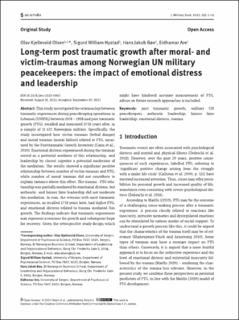Long-term post traumatic growth after moral-and victim-traumas among Norwegian UN military peacekeepers: the impact of emotional distress and leadership. Journal of Military Studies.
Journal article, Peer reviewed
Published version
Permanent lenke
https://hdl.handle.net/11250/3127250Utgivelsesdato
2023Metadata
Vis full innførselSamlinger
Sammendrag
This study investigated the relationship between traumatic experiences during peacekeeping operations in Lebanon (UNIFIL) between 1978 – 1998 and post traumatic growth (PTG), recalled and measured 17-38 years after, in a sample of 11 633 Norwegian military. Specifically, the study investigated how victim traumas (lethal danger) and moral traumas (moral failure) related to PTG, measured by the Posttraumatic Growth Inventory (Cann et al., 2010). Emotional distress experienced during the traumas served as a potential mediator of this relationship, and leadership by closest superior a potential moderator of the mediation. The results showed a significant positive relationship between number of victim traumas and PTG, while number of moral traumas did not contribute to explain variance above this effect. The trauma - PTG relationship was partially mediated by emotional distress, but authentic- and laissez faire leadership did not moderate this mediation. In sum, the veterans with most traumatic experiences, as recalled 17-38 years later, had higher PTG, and emotional distress related to trauma mediated this growth. The findings indicate that traumatic experiences may represent a resource for growth and subsequent hope for recovery. Given the retrospective study-design which might have hindered accurate measurement of PTG, advice on future research approaches is included.

